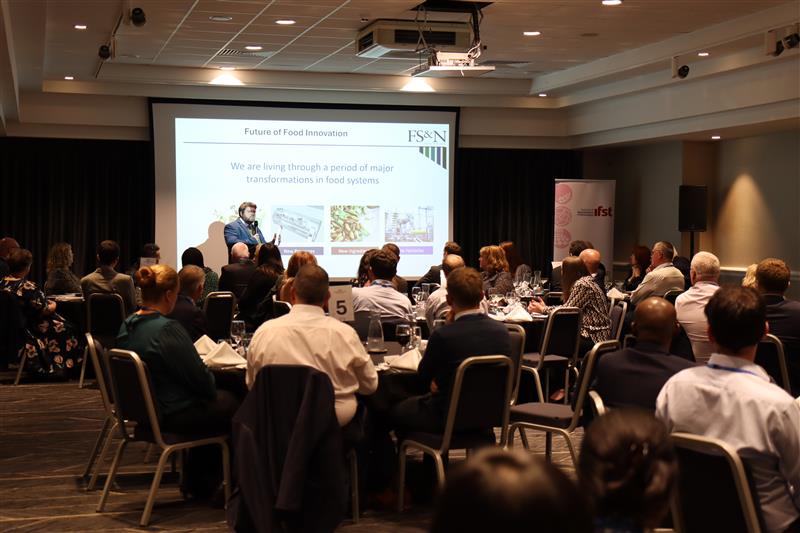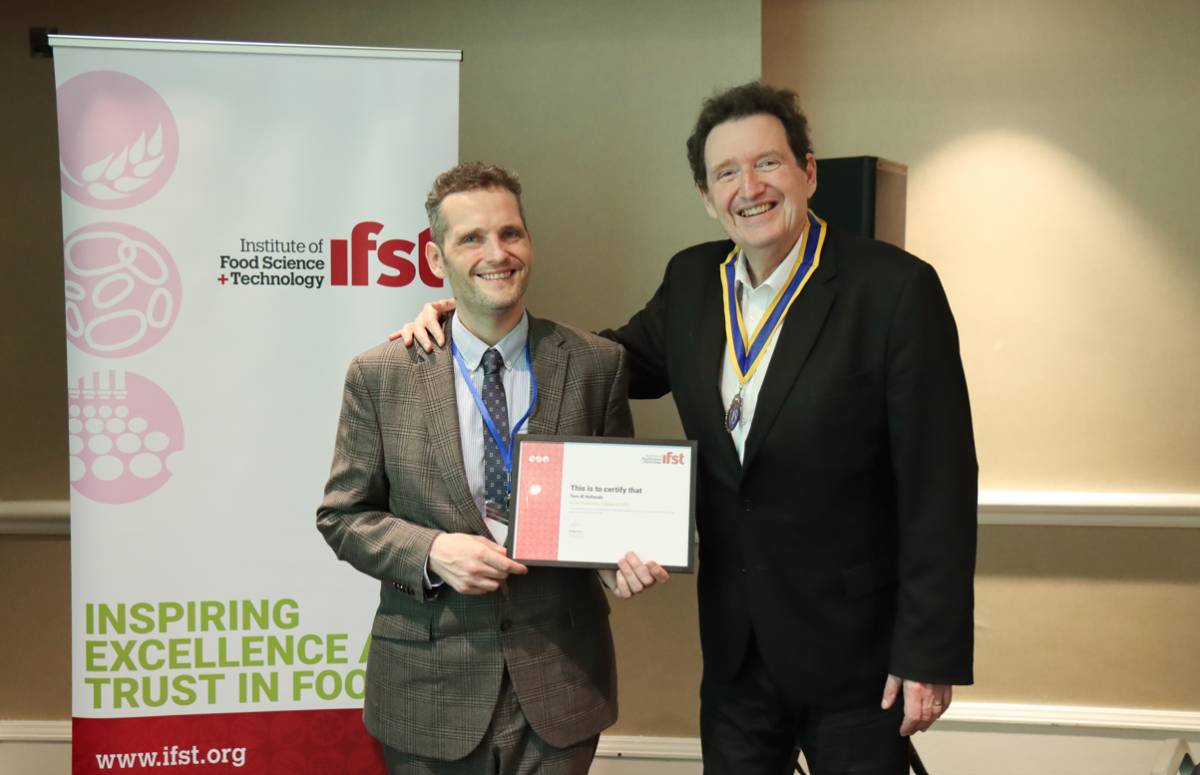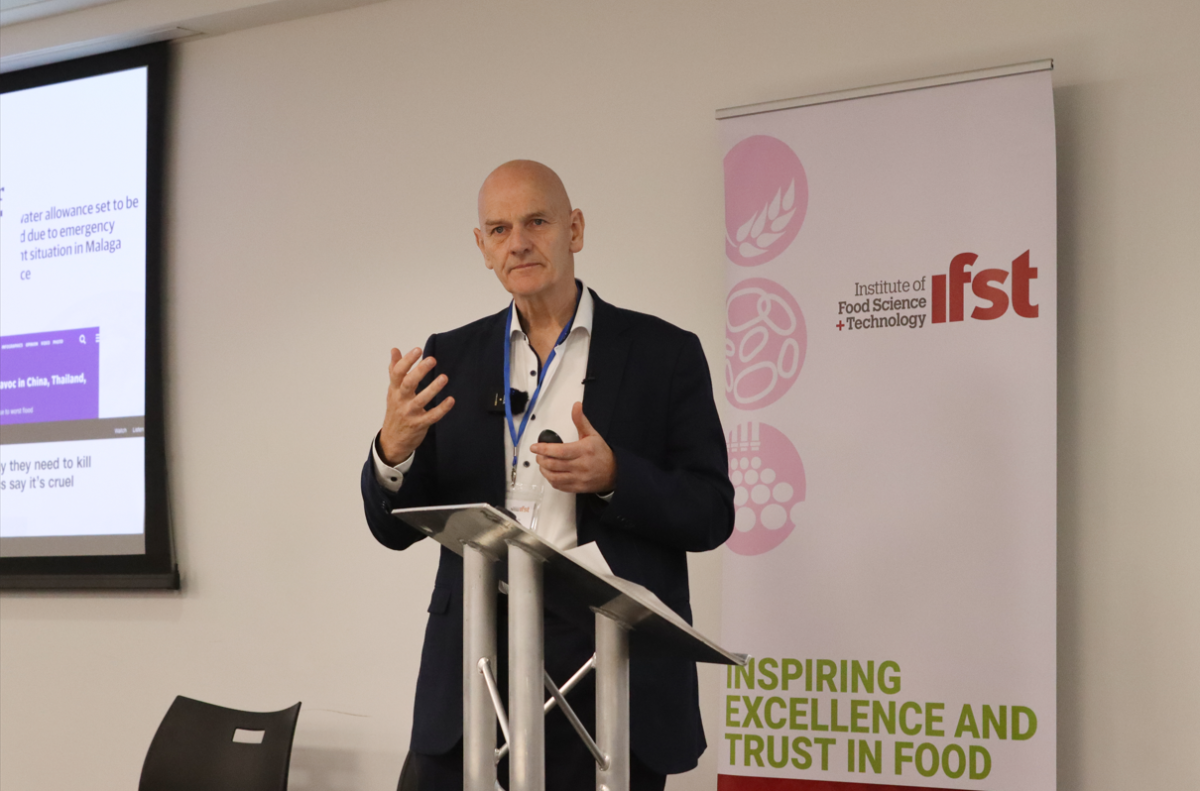
Food Evolution: From Established Practices to the Future of Food
The IFST Autumn Conference 2024 (AC24) was an unforgettable event packed with expert insights, interactive workshops, and discussions on the latest trends and challenges in food science and technology. This year's AC24 themes focussed on ensuring safe, high-quality food; exploring technologies that advance food safety and quality; and promoting innovative, sustainable solutions through novel materials and applications. These themes allowed us to engage deeply with the industry’s pressing issues, providing actionable knowledge and fostering conversations essential to shaping a sustainable future.
We extend our thanks to our Corporate Supporters: TraceGains, MorePeople, Marks & Spencer, IFIS Food and Health Information, Quod, Campden BRI, Nutraceuticals Group, our Dinner and Drinks Sponsor Daymer Ingredients Ltd, and our Student Ticket Sponsor Shield Safety. Their generous support, along with the enthusiastic contributions from attendees, speakers, and partners, made AC24 a success.
 On the evening of 14 October, we kicked off AC24 with a Pre-Conference Dinner and Networking event at the Crowne Plaza Hotel in Leeds City Centre. IFST President Sterling Crew warmly welcomed attendees, setting a celebratory tone for IFST’s 60th Jubilee. A highlight of the evening was the presentation of the IFST Honorary Fellowship, the organization’s highest honour, awarded to Tom Hollands in recognition of his exceptional contributions to food science and technology. This was followed by an insightful talk from Professor Gleb Yakubov, who took us on a journey through the evolution of food science and technology at Leeds. The dinner offered an excellent opportunity for networking, fostering connections, and sparking discussions, making it a memorable start to the conference.
On the evening of 14 October, we kicked off AC24 with a Pre-Conference Dinner and Networking event at the Crowne Plaza Hotel in Leeds City Centre. IFST President Sterling Crew warmly welcomed attendees, setting a celebratory tone for IFST’s 60th Jubilee. A highlight of the evening was the presentation of the IFST Honorary Fellowship, the organization’s highest honour, awarded to Tom Hollands in recognition of his exceptional contributions to food science and technology. This was followed by an insightful talk from Professor Gleb Yakubov, who took us on a journey through the evolution of food science and technology at Leeds. The dinner offered an excellent opportunity for networking, fostering connections, and sparking discussions, making it a memorable start to the conference.
 On the next day, the conference kicked off with keynote speaker, Professor Chris Elliott from Thammasat University, Thailand, whose talk titled "Our Future Food System: Not Short of Challenges…" set the stage. Professor Elliott’s expertise in food security and his work in contaminant detection were invaluable as he discussed the food industry’s global challenges and innovative pathways to address them.
On the next day, the conference kicked off with keynote speaker, Professor Chris Elliott from Thammasat University, Thailand, whose talk titled "Our Future Food System: Not Short of Challenges…" set the stage. Professor Elliott’s expertise in food security and his work in contaminant detection were invaluable as he discussed the food industry’s global challenges and innovative pathways to address them.
 Under the theme of Monitoring and Controlling Safe, Good Quality Food we tackled the pivotal issue of food safety and authenticity. Peter Littleton, Technical Director at Christeyns Food Hygiene Ltd, presented “Getting the Best from Your Environmental Monitoring Programme,” which emphasised strategies for robust contaminant management. Karin Goodburn, Director General at Chilled Food Association, presented “Listeria: Science and Legislation - what’s new and what’s next?,” where she discussed regulatory updates and scientific advancements.
Under the theme of Monitoring and Controlling Safe, Good Quality Food we tackled the pivotal issue of food safety and authenticity. Peter Littleton, Technical Director at Christeyns Food Hygiene Ltd, presented “Getting the Best from Your Environmental Monitoring Programme,” which emphasised strategies for robust contaminant management. Karin Goodburn, Director General at Chilled Food Association, presented “Listeria: Science and Legislation - what’s new and what’s next?,” where she discussed regulatory updates and scientific advancements.
Following the talks, we engaged in discussions about the regulatory landscape and shared insights into best practices. And we moved on to the second theme “Applications: Technologies to Achieve Safe, Good Quality Food” and explored technological advancements transforming the food industry. Nik Watson, Professor of Artificial Intelligence at the University of Leeds, captivated the audience with his session on “AI in Food Production: Opportunities and Challenges” The talk explored the intersection of artificial intelligence and food production, showcasing the latest innovations in digital technologies. Emma Barton, Head of Regulatory Reform, Innovation and Engagement at the Food Standards Agency (FSA), introduced the 'Next steps on reforms to the FSA’s market authorisation service'. Emma explained the upcoming FSA Regulatory Sandbox on Cell-Cultivated Products (CCP), scheduled to launch in February 2025. This sandbox, funded through the Department for Science, Innovation, and Technology's (DSIT) Engineering Biology Sandbox Fund (EBSF) as part of the government’s broader engineering biology strategy, aims to foster safe innovation within the food industry. By providing a structured programme for industry and regulators to collaborate, the sandbox will allow the FSA to better understand CCP hazards and production processes, leading to more efficient regulatory assessments. In the long run, the sandbox allows clearer dossier requirements for CCP producers, faster processing timelines, and the formation of a new scientific advisory sub-group focused on CCPs and other complex, non-routine applications.
Our Case Studies Session, featuring experts Dr Max Grell from BlakBear, Dr John Simpson from Freshcheck, and Dr Mario Hupfeld from Nemis Technologies, provided an applied perspective on cutting-edge technologies like gas-sensing labels for spoilage detection, colour-coded hygiene monitoring, and pathogen detection, sparking ideas on integrating these tools into existing safety protocols.
After some lunch, we dive into our third theme “Innovative (Sustainable) Solutions: Novel Materials and Applications”, where Cheryl Lockett, Consultant at Arthur Branwell & Co. Ltd, led the discussion on “From Jam to Jewels – the Alchemy of Food Tech’s Journey to Crystal Gold,” sharing her journey through the food ingredient sector and highlighting her team’s work on developing lipid crystals as a healthier alternative to traditional emulsifiers. This theme underscored the role of sustainability and novel ingredients in meeting consumer demands while ensuring safety and quality.
For the first time, IFST introduced four interactive workshops designed to foster collaboration and knowledge sharing among delegates. The conference’s workshops, all led by distinguished IFST members, provided hands-on opportunities for attendees to dive deeper into topics relevant to their professional fields. The workshops covered topics such as regulatory challenges, SME support, skills gaps in the food sector, and safety considerations for new technologies. These interactive sessions facilitated meaningful exchanges between participants and experts, reinforcing the value of collaboration and networking within our community.
As we reflect on the success of AC24, we look forward to seeing the impact of these ideas and innovations in the food science field in the years to come. Thank you to everyone who made this event possible; your dedication and passion are what make IFST events so impactful. We eagerly await the next opportunity to gather, collaborate, and innovate.
See more photos from the event here:
